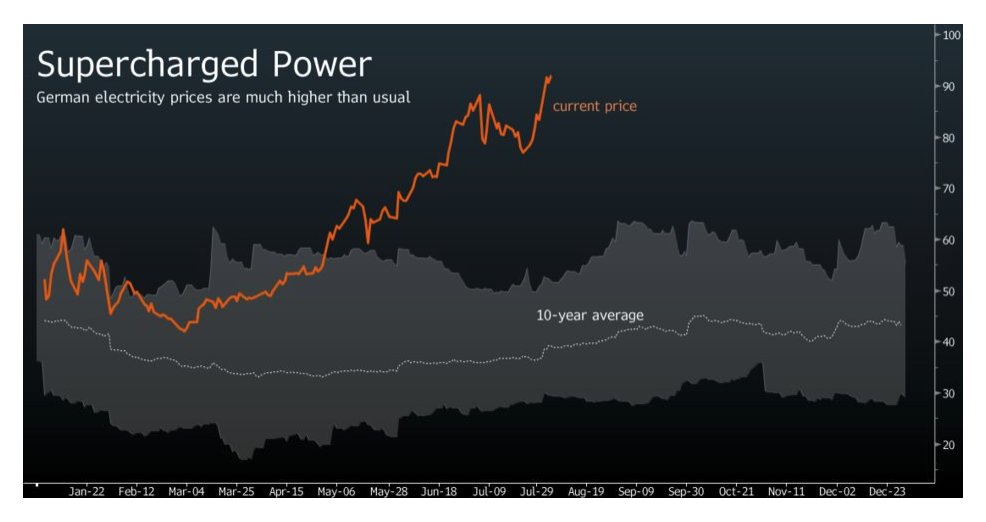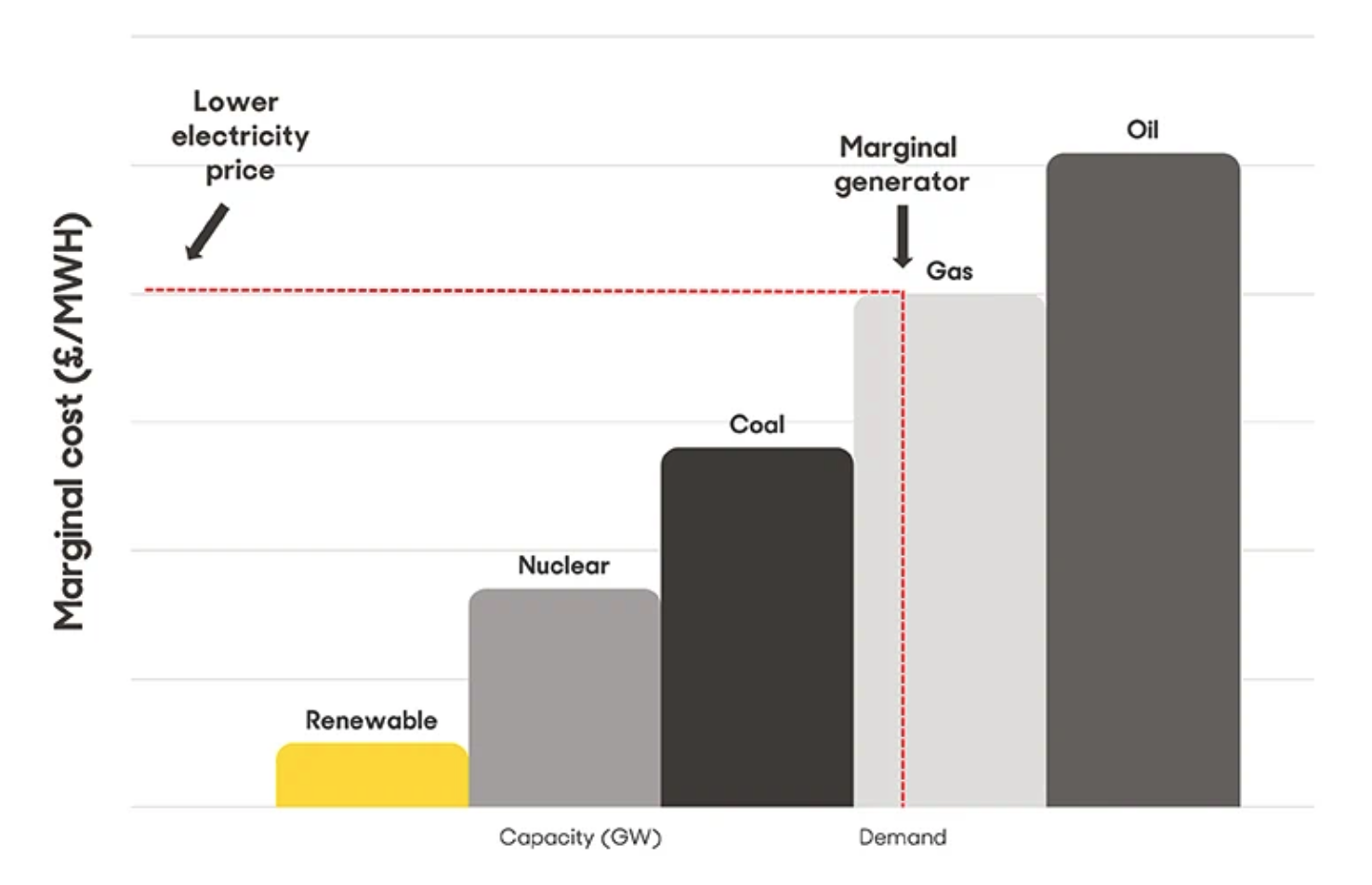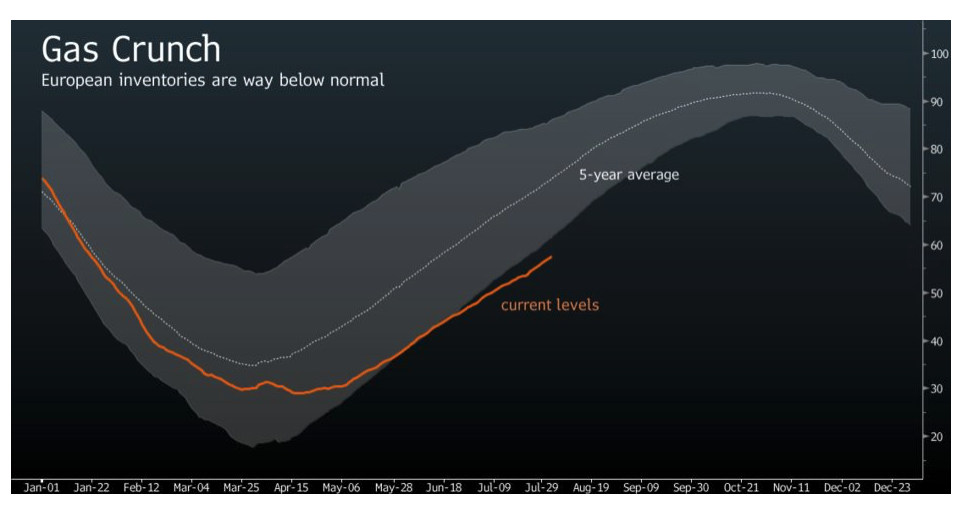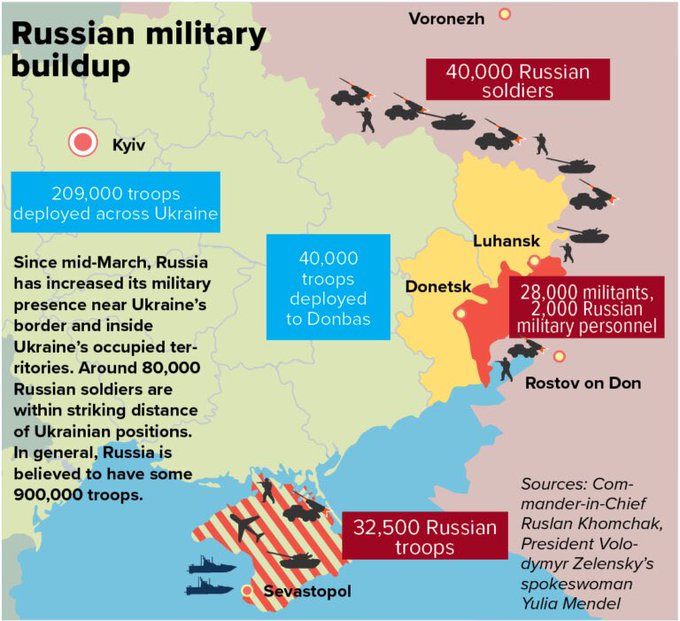Signals of war in August 2021
post by yieldthought · 2022-10-26T08:11:12.847Z · LW · GW · 16 commentsContents
16 comments
Could we have predicted Russia's intention to invade Ukraine earlier? Back in August 2021 the energy prices in Europe doubled and stayed at this level until the start of hostilites:

This, of course, did not go unnoticed. Many, many articles were written about it. Shockingly, a wide range of unsubstantiated theories for the rise were presented in these, often with a suggestion that carbon taxes or decarbonisation was the root cause.
Actually, the root cause was an increase in natural gas prices. This was obvious at the time to anyone who knows how the energy market price is determined:

The cause of the gas price increase was that Russia suddenly restricted its supplies to Europe, which was also noticed and reported on as in this CNBC article titled "Russia is pumping a lot less natural gas to Europe all of a sudden — and it is not clear why".
The effect was to dramatically lower European gas reserves, which was also noticed:

Why would Russia deliberately reduce European gas reserves? To increase their leverage, ideally timed at some point in the future when Europe needs that gas the most. This has to be relatively short-term, as if supply remains low and prices high over the long term Europe will choose to fill its reserves anyway, giving us three main sweet spots:
- Late 2021: reserves insufficient to cover the winter and demand high.
- Early 2022: reserves at their lowest point, but demand decreasing for 9 months.
- Late 2022: demand increasing but risks that reserves have had time to refill.
What conclusions could we draw from information in August 2021 about this? Well, by April of 2021 Russia had amassed significant and unusual forces on the border with Ukraine, which was also well-reported:

Russia claimed the forces were on training exercises. Western spectators mostly seem to have assumed sabre-rattling.
That interpretation is inconsistent with reducing gas supply to Europe over a period of months to ensure gas supplies will be depleted after the winter of 2021. The logical conclusion from Russia's military buildup (which intensified in October 2021) must have been that Putin plans to invade, ideally in late 2021 but at the latest in early 2022.
With 20/20 hindsight it's easy to cherry-pick evidence. So I have a few questions:
- Who drew this connection in August / October 2021? I haven't found anything but would love to update on these people's current analysis of events.
- What's was the steel-man case in August / October 2021 that Putin is not preparing for war - which other concrete information out there was strong enough to overlook these clear signs of economic and military preparation for war?
- Is there evidence that the invasion was delayed by 1-2 months? The economic timing suggests Putin would have had more leverage if he had invaded at the start of winter. Indeed, much was made of the spring thawing making the invasion harder (soft ground channels heavy vehicles along roads, making them more vulnerable) and the actual timing meant Europe was able to refill its gas reserves ahead of the 2022 winter.
This is a rare opportunity to look back and update on world-model predictions. The information was there. Who saw it and made the case?
16 comments
Comments sorted by top scores.
comment by Slider · 2022-10-26T10:10:31.665Z · LW(p) · GW(p)
I believe that China requested a delay in the spirit of "dude, not during olympics plz"
Replies from: yieldthought↑ comment by yieldthought · 2022-10-27T10:30:21.269Z · LW(p) · GW(p)
This is a good one and the timing suggests it is true at least in the short term. The Olympics only started in Feb ‘22 though. Do we have any indication that China made Putin wait for several months?
Replies from: TrevorWiesinger↑ comment by trevor (TrevorWiesinger) · 2022-10-28T04:32:00.748Z · LW(p) · GW(p)
China made Putin wait for several months
International diplomacy involves a lot of anticipation instead of direct messaging, but even so, in this case I'd say it's definitely more about Putin looking out for China than the other way around. The winter olympics were only China's second olympics ever, and possibly China's last olympics ever, and the ruling party clearly treated them as a Schelling Point [LW · GW]. It would be a bad idea to fray ties with China at such a critical time.
comment by Wei Dai (Wei_Dai) · 2022-10-27T00:09:07.428Z · LW(p) · GW(p)
That interpretation is inconsistent with reducing gas supply to Europe over a period of months to ensure gas supplies will be depleted after the winter of 2021. The logical conclusion from Russia’s military buildup (which intensified in October 2021) must have been that Putin plans to invade, ideally in late 2021 but at the latest in early 2022.
Why "must"? Why couldn't it have been a bluff, in which Putin wants others to think he will invade (unless given sufficient concessions) but if no concessions are given, he plans to end the "exercises" and pull back? I don't see how you could rule out this possibility using just the gas supply evidence. If he was bluffing, he would have wanted to make it as realistic as possible, which would have included reducing gas supply.
Replies from: yieldthought↑ comment by yieldthought · 2022-10-27T10:33:18.842Z · LW(p) · GW(p)
This is a fair point. I don’t know what economic cost Russia paid by reducing gas nor if they could expect to make that up by shipping more later on. Perhaps this was a relatively low-cost and sensible extension of the military positioning.
I guess I have updated to: could we have known that Putin was fully-prepared for war and making a credible threat of invasion. I didn’t really see discussion of that so early, and would still love to find sources that did so.
Also: a threat implies demands, negotiation. If we think in these terms, did Putin make genuinely fulfilled demands that would have avoided the war? Or was he driven by internal needs?
Replies from: ChristianKl↑ comment by ChristianKl · 2022-10-27T11:37:29.833Z · LW(p) · GW(p)
If Putin would have gotten a deal that would have gotten him some of his demands without waging a war, that would have likely been popular at home.
But it might have been impossible for Kyiv to agree to such a deal without far-right militia doing another coup. As Everyone is talking about Minsk but what does it mean for Ukraine? says it:
“Notice that [Ukrainian president] Zelenskyi is not connecting the escalation on Ukraine’s borders with the implementation of Minsk, because he knows that the implementation of Minsk could be more dangerous for Ukraine’s stability than what’s happening on the borders,” Shulga said.
[...]
Far-Right expert Michael Colborne believes that if Kyiv’s government tried to implement Minsk, there would be backlash from large swathes of the Ukrainian population.
comment by Ben (ben-lang) · 2022-10-26T11:14:50.152Z · LW(p) · GW(p)
I can't remember the exact timing, but the UK and US governments/intelligence services were giving briefings to the press to the effect "Russia is preparing to invade Ukraine. They must back down." The earliest I have found is from November 2021, but I think it was covered before then. Not sure when they first said anything, presumably they knew before they said and they suspected before they knew.
I think that their was still a chance of buying peace with concessions until the day the tanks rolled. Russia asked for Nato to promise to never admit Ukraine. I believe they also made some other demands. Its not either/or when it comes to sabre rattling or genuine preparation to invade. An actually prepared invasion seems like a good threat to take into a negotiation. And if they still don't give you what you want you have this lovely invasion all ready to go. (Although less ready than they thought.)
Replies from: ChristianKl↑ comment by ChristianKl · 2022-10-28T15:17:33.946Z · LW(p) · GW(p)
Russia asked for Nato to promise to never admit Ukraine. I believe they also made some other demands.
Russia also made other demands, it's just that it's much easier in Western media to talk about that demand regarding NATO than complicated issues like all the points in the Minsk agreements and Crimean water rights.
comment by DirectedEvolution (AllAmericanBreakfast) · 2022-10-26T23:09:46.355Z · LW(p) · GW(p)
Note: I have zero expertise in the situation, and this is just my attempt to make sense of the situation.
Oct. 13, 2021: Putin claims that German approval of Nord Stream 2 was an "obvious" way to relieve natural gas prices.
- Opposition to Nord Stream 2 by the USA has long been framed in a security argument. As an example, an Aug. 30 column (by Mark Temnycky, but he was far from the only person to see the strategic implications of Nord Stream 2) stated "The deleterious effects are easy to foresee: If relations were to sour, Russia could turn off the flow of gas to Europe, potentially leaving millions of Europeans without it... What’s more, Europe’s dependence on Russian gas could embolden the country to meddle further in Ukraine’s affairs, without fear of repercussions. That could lead to an escalation in the Donbas conflict — a yearslong Russian military incursion in eastern Ukraine that has led to the deaths of over 14,000 people and the displacement of nearly two million — or even a Russian effort to unite eastern Ukraine with Crimea."
Sept. 1, 2021: Biden and Zelensky meet for the first time in the Oval office to state opposition to "Russian aggression." The frame was as a way to reinforce ongoing US commitment to Ukrainian security even as the US pulled out of Afghanistan.
July 30, 2021: USA drops effort to block Nord Stream 2 due to the project being too advanced to stop.
Apologies for all the paywalled NY Times links, they just make it easy to search for articles within a defined date range.
Maybe the big takeaway here is this zero-sum game theoretic model:
- World leaders are smart gamblers.
- Smart gamblers bluff both to win a losing hand, and to trick others into playing when they have a winning hand. In other words, they cultivate strategic ambiguity.
- Smart gamblers don't play games with negative expected value.
- The anti-inductive nature of gambling means that even the best players will only have a small edge.
- Since people don't play games they expect to lose, the game's players all expect to win.
- If you're not playing the game, be ready to be surprised by the outcome.
Here's how I'd apply it retrospectively:
- "Policy" is the word for credibly and honestly telling somebody exactly what you'll do in a given situation. "Threat" is the word we use when we're truly not sure if the other player's holding a strong hand, or whether they're bluffing. "Bullshit" is the word we use when they other player is making non-credible bluffs. Nobody was bullshitting in this situation. They were making threats in order to extract policy concessions.
- It can be politically useful to accuse someone of bluffing for a variety of reasons. Bluffing is a smaller infraction than making a serious threat, so an accusation of bluffing gives you and the person you're accusing a way to back down. Claiming a threat is merely a bluff makes the threat/bluff more expensive to maintain, because they have to bolster it to make it more credible. It also buys time before you have to start taking the threat seriously. But you can only claim a threat is a bluff so many times before saying "you're bluffing" itself becomes non-credible. So when a world leader or major newspaper accused Putin of "sabre-rattling," we can't necessarily assume that's what they really think. It's a move in the game, not a straightforward assessment of the situation.
- It's rare but not impossible for a world leader to be a bullshitting idiot. It's more likely they're a shark, someone for whom their best strategy is to play down their competence and get their rivals to underestimate them. Donald Trump would be a great example. Putin, especially by 2021, was clearly not an idiot, and so we should have assumed that Putin never bullshits - he only makes threats.
- Nord Stream 2 and military buildups were a genuine threat. The energy threat was made credible by the fact of European energy demand and artificially constrained supply (i.e. by the anti-nuclear lobby and decarbonization efforts). The military threat was partly made credible by the invasion of Crimea, but on a deeper level, Putin wouldn't have threatened an invasion if there wasn't a serious possibility he might do so.
- Another genuine threat was military support to Ukraine, along with threats of sanctions. The US's powerful military and economic engine, its lower level of reliance on Russian energy, its historical willingness to get its military involved around the world, and its vocal support for Ukraine even during the withdrawal from Afghanistan made that threat credible.
I find it hard to think this way. But I think world leaders are really good at it.
Replies from: ChristianKl↑ comment by ChristianKl · 2022-10-27T08:51:52.472Z · LW(p) · GW(p)
Apologies for all the paywalled NY Times links, they just make it easy to search for articles within a defined date range.
Google recently also has the ability to specify the date range in Tools/[Any time]Dropdown/Custom Range...
comment by Hastings (hastings-greer) · 2022-10-26T17:37:20.564Z · LW(p) · GW(p)
- Who drew this connection in August / October 2021? I haven't found anything but would love to update on these people's current analysis of events.
Notably, in August 2021 the US, without a great deal of preparation and at great political cost, pulled out of Afghanistan.
Motivation: in the event of a Ukraine-Russia war, the US would be diplomatically embarassed if Russia could point to an ongoing war in Afghanistan as "equivalent" to their invasion. In addition, a war in Afghanistan would serve as a distraction to US armed forces.
Counterpoints: The US had signalled before that they intended to pull out at this date, in the previous administration's negotiations with the Taliban. Also, Russia could just claim that their invasion was equivalent to the US's past invasions of Afghanistan and Iraq, even if they were ended.
comment by ChristianKl · 2022-10-27T08:58:19.671Z · LW(p) · GW(p)
It's very difficult to distinguish genuine signs of war from signals of willingness to wage war to gain a benefit in negotiations.
Russia certainly planned to change the status quo. I thought at the time that, the threat of war would be enough to get the West to the table to come to an agreement that satisfies what Putin wanted to achieve because it would have been better for both the West and Russia than the war that ensured.
I think a major aspect that I didn't think about was that at the time the Russian population wanted the war. It wanted it enough to give Putin +15% on its approval rating for starting it. Western propaganda suggested that the Russian population actually shared Western sentiments and that it was just Putin who is the evil dictator, which gave the wrong sense of the political forces within Russia.
comment by trevor (TrevorWiesinger) · 2022-10-28T04:27:50.176Z · LW(p) · GW(p)
Something similar seems to have happened with oil. When OPEC+ made their move, the shift in oil prices was tiny compared to the months before and after the war started. It seems like commodity people were buying up oil in order to hedge for the possibility of refinery hacking, massive trade decoupling, and a second Cold War more generally (which could last a long time), resulting in much higher oil prices in March than any time afterwards, including OPEC+'s production cut.
comment by ChristianKl · 2022-10-28T15:12:35.292Z · LW(p) · GW(p)
I thought about it more. The key question of whether or not there was a war was about whether there would be a possible compromise that both sides could live with.
To predict that you would need to look at the political situation and public opinion in Ukraine and Russia.
In Ukraine, it's very unlikely that anything that gives Donbas and Luhansk more autonomy would be able to pass parliament even if Ukraine's president wanted it.
Given how the Russian media reported on Donbas and Luhansk, the image that Russians of what had happened in Donbas and Luhansk necessitated Russia to take action.
comment by Shmi (shminux) · 2022-10-27T07:48:30.095Z · LW(p) · GW(p)
I didn't believe an invasion was about to happen up until it had. At most I thought Putin would place Russian troops in the breakaway regions. I would have given less than 5% odds to a direct attack on Kyiv. Even with the benefit of hindsight I still cannot make sense of what transpired. Even if Putin managed to conquer most major cities, Ukraine would have become a major pain for him. I assume this is ideology trumping reason.
Replies from: ChristianKl↑ comment by ChristianKl · 2022-10-27T09:00:31.168Z · LW(p) · GW(p)
Ukraine would have produced pain for Russia but for Putin himself that would have resulted in a strong increase in his approval within the Russian population and the Russian power centers.